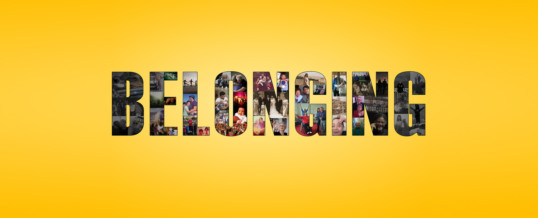Intern Blog Series: Maslow's Need of Belonging
Knowing that one belongs to a group and shares a similar identity with others is a need that has been formed since humans had the ability to sustain agriculture. This need is listed as love/belonging on Maslow’s Hierarchy of Needs. While nourishment, shelter, and security are the largest needs to be filled in the hierarchy, once they have been met a person can focus on more than just survival. This feeling is found inside almost every single person in the world, and the fact that this type of feeling is listed in such a chart shows insight to the connections between individuals. This feeling not only connects humans figuratively but literally as well. Leading people to join groups that they identify with, seek family where they feel loved, and participate on a national level in their country purely based off of national identity. Political scientists define a nation as a group of people within a certain area that all share in culture, tradition, and history. While many think that a nation refers to a country or a state this was not always true. Globalization and technological advances have allowed for the spread of ideas and people as well as changing the way we view the word nation. Many groups of people have migrated from their ancestral homes and now live in new countries surrounded by many people that do not share the same cultures, traditions, and histories as they do. These people will still have the need and drive to join together into groups where they feel they belong. If this group happens to be one that is affiliated with identity and country it is called nationalism. Nationalism, the feelings of patriotism, is one of the ways people reach out to one another. Whether this is calling oneself “American,” “Spanish,” “Ethiopian,” or any other self-identifier for a person’s country, we all understand this feeling of belonging when we stake our claim in a country: or do we? There are many people out there who have had their national identity stripped away or have never felt a sense of belonging to their country. This can be found frequently in those who have been displaced due to disasters, conflict, the collapse of government, or violence, those who have been homeless in a rich country that stands for the “free” and gives every citizen “equal opportunity,” or those who were born in camps while their parents waited for the moment a state power rescues them from the fate of death that so many meet living outside of a sovereign state. These people, displaced; homeless; and country-less, seek to find the life that everyone seems to have on the outside. Where they belong, where they can say, “I am a(n)…” but for many, this will never happen. Out of the 40 million internally displaced peoples around the world, only a small number of them are able to return home in a short period of time, if at all, due to the great possibility of their home being destroyed, thus losing not only their personal items but their sense belonging. In the US over 500,000 people are homeless, 380,000 of which are under the age of 24. Many of these people feel the United States, a country that stands for equal opportunity and treatment, has turned its back to them. Showing to them that just because someone is a part of a group they are not equal and will not be treated as equal, thus causing these citizens to lose hope in their state. Around the world, there are 21.3 million asylum seekers and refugees living inside of refugee camps, over half of this amount is under the age of 18. They wait in these camps to return home (if that is possible) or to be selected by the United Nations High Commissioner for Refugees (UNHCR) and another country to be moved to that country and start a new life. Sadly, only 10% of these people will receive refugee status or be able to return to their home country. This feeling of never knowing and unrest can leave people feeling lost in their identity. Without having voices for themselves there is the need for people that work to give these groups voices on national and international platforms. So, next time you think about these people around the world, or feel its time to step up and take action remember you have a voice. While this voice may be in a group so large that it can feel drowned out with perseverance and dedication the effort you put into giving these people voices will better the world. Not only for them but for countless people they have the possibility of impacting. Nationalism to people like the displaced, the homeless, and the refugees is more than just flying a flag and singing a national anthem. It’s the ability to identify one’s self with a whole country of other people, and to be able to do that while standing tall and proud after losing everything, or possibly not having anything from the beginning. This type of group belonging can mean more than any physical possession ever could. Megan]]>

